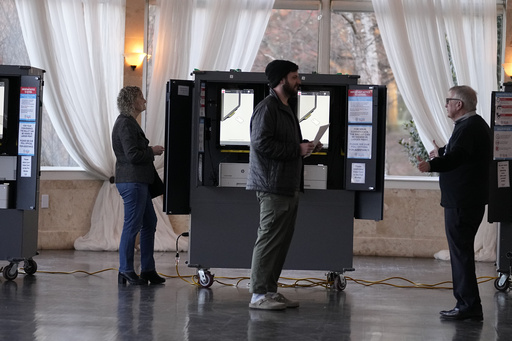ATLANTA (AP) — Georgia voters are beginning to have their say on party primary races and nonpartisan judicial elections.
Three weeks of early in-person voting is set to begin Monday ahead of the May 21 election, when parties will choose their nominees for congressional and state legislative seats, as well as for local races including sheriffs, district attorneys and county commissioners.
May 21 also is the general election for judicial candidates, who run on a nonpartisan basis.
Mail-in ballots were sent last week to those who had requested them, while people can continue to request a mail ballot through May 10.
Among the top races are a state supreme court race between incumbent Justice Andrew Pinson and challenger John Barrow and primaries in the 3rd Congressional District, where incumbent Republican U.S. Rep. Drew Ferguson is stepping down.
Runoffs will be held June 18 in races where candidates don’t win a majority in May.
Here’s a look at the election and some top races:
CONGRESSIONAL SHOWDOWN
Six Republicans are seeking their party’s nomination to succeed Ferguson in a district that runs along the Alabama border from Carrollton to Columbus and swings east into the Atlanta suburbs around Peachtree City and Fayetteville.
Former President Donald Trump has endorsed his onetime aide Brian Jack for the seat. Also seeking the nomination are former state Sens. Mike Crane and Mike Dugan, former state Rep. Philip Singleton, Jim Bennett and Ray Blair.
On the Democratic side, Val Almonord and Maura Keller are seeking their party’s nomination in the heavily GOP district.
STATE SUPREME COURT
The May 21 vote is the general election for judicial candidates, who run without party labels.
Incumbent Justice Andrew Pinson, who was appointed to the court by Gov. Brian Kemp in 2022, is trying to win a six-year term. He is opposed by John Barrow, a former Democratic congressman. Barrow says he believes Georgians have a right to abortion under the state constitution, while Pinson says it’s inappropriate for him to talk about issues and important not to make the race partisan.
Justices Michael Boggs, John Ellington and Nels Peterson are unopposed. Six judges on the Georgia Court of Appeals are also unopposed, while Jeff Davis and Tabitha Ponder are contending for an open seat on that intermediate court of appeal.
OTHER CONGRESSIONAL RACES
Incumbent U.S. Reps. Lucy McBath and David Scott, both Democrats, face challengers from their own party in redrawn districts.
Scott faces six challengers in the 13th District in Atlanta’s southern and eastern suburbs. They include former East Point City Council member Karen René, former South Fulton City Council member Mark Baker and attorney Brian Johnson. On the Republican side, Jonathan Chavez is running against Johsie Fletcher.
U.S. Rep. Lucy McBath has jumped from the 7th District to run in the 6th District, on the western side of metro Atlanta. She’s being challenged by fellow Democrats Mandisha Thomas, a state representative, and Jerica Richardson, a Cobb County commissioner.
LOCAL RACES
Fulton County District Attorney Fani Willis, in the national spotlight for her prosecution of former President Trump and others, faces attorney Christian Wise Smith in the Democratic primary. Fulton County Superior Court Judge Scott McAfee, who is presiding in the same case, is being challenged by lawyer and talk show host Robert Patillo. Lawyer Tiffani Johnson was disqualified from challenging McAfee.
WHAT WILL TURNOUT BE LIKE?
While 5 million or more Georgians could vote in November’s presidential election, history suggests many fewer people will vote in the primary.
In 2016, the last time the state primaries didn’t coincide with the presidential primary, only one-fifth as many people voted in May as in the presidential general election in November. With few hotly contested congressional primaries, races for county offices may be what bring voters to the polls in some parts of Georgia.


